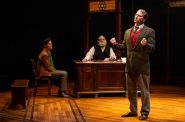Crime and Punishment, abridged at APT
Smart teenagers with Theories of Everything make you wish you could fast forward to their mid-20s, when they’re likely to be more sensible and less tiresome.
Sunday evening at American Players Theatre, I was wishing for a fast-forward button for Raskolnikov about 30 minutes into Crime and Punishment, as abridged and adapted by Marilyn Campbell and Curt Columbus. At 90 minutes, the play (given in the intimate, indoor Touchstone Theatre) is at once too long and too brief.
In reducing Dostoyevsky’s psychological and existential drama to 90 minutes, the playwrights make the tortured protagonist less interesting. Dostoyevsky puts us inside Raskolnikov’s head, to an extent that his absurd theories to justify a murder almost seem to make some sense; speeded up and externalized, not so much. Likewise, in the novel his long unraveling and final confession take on terrifying suspense and inevitability. On the stage, his endless expounding and repeating of his principles grow tedious.
Campbell and Columbus adapted the piece in 2002, and that surprised me. Their version has a 1950s, Playhouse 90 vibe, with its stark, black-and-white austerity, expressionist gloom and self-conscious avant-gardism. The play flows from scene to scene in cinematic and dreamlike fashion, to follow through on the conceit that we are observing a dream or recollection within Raskolnikov’s fevered brain. Certain phrases recur, in dialog and voice-over, as poetic litanies. At one point, the house lights come abruptly full, and Matt Schwader’s Raskolnikov addresses the audience with a Utilitarian moral question about snuffing out one life to preserve the lives of many. (Raskolnikov soon admits that the question had little to do with his actions. So the whole episode is a bit of a red herring.)
Kenneth Albers directed with a skilled hand. Surely he had much to do with the clear delineation of the multiple roles and with the clarity of locales drawn from the thin air of Nathan Stuber’s spare, open set.
Crime and Punishment is one of several plays running at American Players Theatre, in Spring Green, Wis. Visit the APT website for a full schedule. Clink on the links for reviews of The Taming of the Shrew, The Critic and The Glass Menagerie.
Theater
-
‘L’Appartement’ Is a Mind-Bending Comedy
 Mar 25th, 2024 by Dominique Paul Noth
Mar 25th, 2024 by Dominique Paul Noth
-
‘The Mountaintop’ Offers Very Human Martin Luther King Jr.
 Mar 11th, 2024 by Dominique Paul Noth
Mar 11th, 2024 by Dominique Paul Noth
-
‘The Chosen’ Is Subtly Powerful Drama
 Mar 10th, 2024 by Dominique Paul Noth
Mar 10th, 2024 by Dominique Paul Noth

















